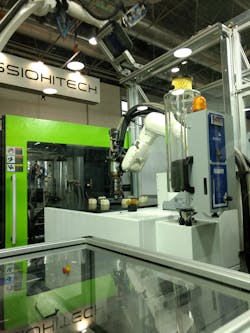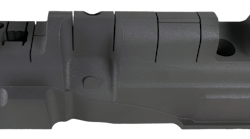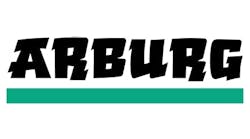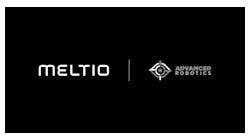By Bruce Geiselman
A new additive manufacturing system from Yizumi Germany combines an extrusion head with a six-axis robotic arm that moves the head as it deposits resin in layers. The flexible robotic system, known as the SpaceA, can be used to perform overmolding in conjunction with injection molding machines.
Yizumi demonstrated the system at K 2019 in October in Düsseldorf, Germany, and Formnext 2019 in November in Frankfurt, Germany.
Yizumi manufactures injection molding machines, and the SpaceA system can easily be incorporated into an injection molding environment, said Nicolai Lammert, head of additive manufacturing for Yizumi Germany.
“We based our system on robotics,” he said. “That means we can easily bring them in touch with other technologies like injection molding. You really can use our technology here in an automation approach, and that makes it really cheap.”
At K 2019, Yizumi demonstrated the system operating in conjunction with an injection molding machine. A robotic arm removed an engine cover from the IMM, placed it on a platform, and the SpaceA printer used a carbon-fiber-filled polyamide to add a rib structure to the part.
Applications for the SpaceA system include applying sealing elements or reinforcing structures to injection molded parts.
“We can substitute a two-component injection molding machine with one standard injection molding machine and one printer,” Lammert said. “Also, the mold can be way easier. It is more economic for some use cases to overprint plastic structures with our printer. You have the possibility to make the part stronger by using a special polymer with fibers in it.”
The SpaceA’s print head moves with positioning accuracy to within 0.05mm. The system is packaged with control technology, including an 18.5-inch multicolor display.
The system uses conventional thermoplastic pellets instead of the filaments used by many 3-D printers, Lammert said. That allows for printing with highly filled compounds. The SpaceA system also can print resins reinforced with carbon fibers.
The system comes in three configurations:
· The extruder extension package includes a dryer, material conveyer, screw extruder and a control unit for pneumatic and electrical components. Customers can combine the Yizumi equipment with their own six-axis robot for cost savings.
· The small machine package includes all the equipment in the extruder extension package, as well as an industrial robot and a housing.
· The big machine package is similar to the small machine package, but includes a larger housing and is divided into print and platform modules. Different robot sizes and ranges can be incorporated into the larger housing.
“Our philosophy is to adjust the robot size to the part size,” Lammert said. “If you want to produce small parts (up to 640mm length), then you can use the small machine. But if you want to produce bigger parts, then you have to increase the robot size as much as possible. With that strategy, we are competitive with injection molding in certain lot sizes.”
Lammert is not only the head of additive manufacturing for Yizumi, Germany, he also is the developer of the SpaceA technology.
“I developed the system at the IKV [Institute for Plastics Processing] at RWTH Aachen University from 2015 to 2018,” Lammert said. “After 2018, I started my work at Yizumi, and we industrialized the technology together with the IKV. Last year, we presented our prototypes, and on Formnext 2019, we launch our system to the market, and it is available now.”
U.S. customers interested in the technology should contact Yizumi Germany, Lammert said.
Yizumi Germany GmbH, Aachen, Germany, 49-241-412-523-21, www.yizumi-germany.de, 49-241-412-523-21




